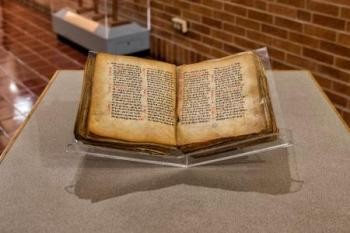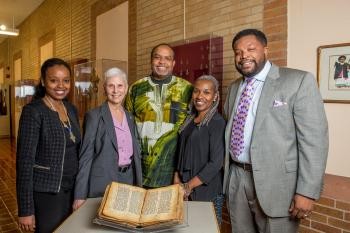Representatives from the Howard University School of Divinity (HUSD) have traveled to Addis Ababa, Ethiopia, to return a sacred 14-15th century manuscript to Debre Libanos Monastery, one of Ethiopia’s holiest sites.
The manuscript, known as Tweed MS150, contains two different texts: the Acts of Paul and the Acts of Serabamon. It is part of one of the largest collections of Ethiopian sacred artifacts housed in the United States.
The 240-piece collection was originally gifted to HUSD in 1993 by the late Dr. André Tweed, a prominent psychiatrist and alumnus of the University. The manuscript is a rare text that provides historical insights into early Christianity and the connection between African and Judaic cultures and traditions.
“This has been a longstanding commitment of the School of Divinity—to honor the rich heritage and cultural artifacts throughout Africa, in particular Ethiopia,” says the Rev. Dr. Gay L. Byron, PC(USA) teaching elder, associate dean for academic affairs and professor of New Testament and Early Christianity. “With all due institutional integrity, we wanted to set an example for other schools, museums and institutions around this county and even throughout the world for what it means to have rare manuscripts actually in their rightful home of origin.”
Byron was one of the first scholars to research this manuscript and clarify its provenance. For years HUSD has faced a series of legal, ecclesiastical, scholarly and administrative hurdles related to the manuscript.

The ‘Tweed MS150’ manuscript, now being returned to the Debre Libanos Monastery in Ethiopia. —J. Knight, Howard University
“When we got the collection, I began to hope that we could digitize the collection, but initially it seemed far too expensive to do it,” explains the Rev. Dr. Alice Ogden Bellis, PC(USA) teaching elder and professor of Hebrew Bible. “After a number of false starts we got a small grant and digitized all of the manuscripts. The next step was cataloging them, and it was in the process of cataloging the manuscripts that we discovered that Tweed MS150 belonged to Debre Libanos Monastery.”
“Then began the long process of figuring out how we could legally return the manuscript to its rightful home,” she added.
Ethiopia is known as one of the first areas beyond Jerusalem and Israel to embrace Christianity, and the first country to accept Christianity as its national religion. Memhir Dr. Zebene Lemma, head priest at Debre Genet Medhane Alem Ethiopian Orthodox Tewahido Church in Temple Hills, Md., is traveling as part of the HUSD team. A graduate of HUSD, Lemma has described the return of the manuscript as an impressive historic action that will reinforce international awareness of African culture and history.
“This manuscript was written by Ethiopians,” he says. “So returning the manuscript is a huge impact for Ethiopian church history, and it establishes a strong relationship with Howard University.”
The Ethiopian Orthodox Church recently celebrated Christmas and Lemma notes, “This time is a momentous event for the Ethiopians as we celebrate the birth and baptism of our Lord and God Jesus Christ. Numerous holy books, crosses and countless artifacts are still in the possession of private collections and museums, that have no moral right to stay there, especially in Britain, Germany and France. This is an eye-opener for the Ethiopian—to return Ethiopian books to its original places.”
Lawrence Rodgers is the student representative on the trip. “This trip means a lot to me. Being able to travel to this ancient country and to be able to visit some of the oldest Christian churches in the world, seeing this rich Christian heritage on the continent of my ancestors is something that is very meaningful to me,” Rodgers says.
HUSD Dean Dr. Alton B. Pollard, III, also accompanying the group, shared sentiments reflecting the historical and biblical context of the journey.
“It harkens to mind for me the memories of research learning that there was a time in the experience of people of African descent in this country where the most preached text from the biblical witness came from Psalms 68:31 that reads ‘princes shall come out of Egypt, Ethiopia shall stretch forth her hand unto God,’” he says. “We continue to stretch forth our hand to God, and we are so pleased to stretch forth our hand to our sisters and brothers in Ethiopia.”
The two-week journey will conclude at the end of January.

